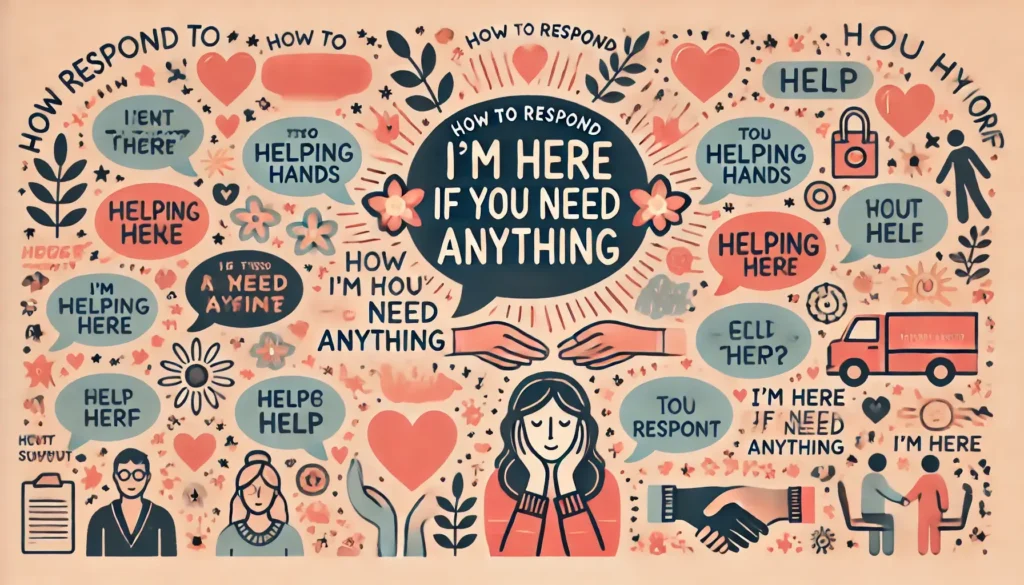
Thank you so much. I really appreciate your offer.
Receiving support from friends or family can be comforting during challenging times. Responding to “I’m here if you need anything” with gratitude and clarity fosters stronger connections. Expressing thanks and a specific request or assurance allows the helper to feel valued.
This mutual respect strengthens your relationship and ensures you get the support you need. Use such opportunities to create a deeper bond by acknowledging their willingness to help. Clear communication is key to making the most of their offer. A heartfelt response goes a long way in showing appreciation and maintaining a supportive network around you.
Understanding The Situation
Hearing “I’m here if you need anything” can be comforting, but sometimes it’s hard to know how to respond. Understanding the situation helps you provide the right reply. This guide will help you recognize the need and offer empathy and support effectively.
Recognizing The Need
To respond well, you must first recognize the need. People may say “I’m here if you need anything” during tough times, like illness, grief, or stress. Identifying the context helps you respond appropriately.
Here are some common scenarios:
- Illness: When someone is sick, they might need help with daily tasks.
- Grief: After a loss, emotional support is crucial.
- Stress: During stressful periods, people might need someone to talk to.
Pay attention to non-verbal cues like body language and tone. A friend who avoids eye contact or has a shaky voice may need immediate support.
Ask specific questions to understand their needs better:
- Would you like me to bring you a meal?
- Can I help with your errands?
- Do you need someone to talk to?
By recognizing the need, you can offer more effective and targeted help.
Empathy And Support
Showing empathy and support means understanding and sharing the feelings of others. This can be done through active listening and validating their emotions.
Here are some ways to show empathy:
- Listen actively: Give your full attention, nod, and make eye contact.
- Validate their feelings: Say things like “I understand how you feel” or “It’s okay to feel this way.”
- Offer specific help: Instead of saying “Let me know if you need anything,” offer concrete assistance.
Use a table to differentiate between supportive and non-supportive responses:
| Supportive Responses | Non-Supportive Responses |
|---|---|
| “I understand this is hard for you.” | “You’ll get over it.” |
| “I’m here to listen.” | “Don’t worry about it.” |
| “How can I help you today?” | “Let me know if you need anything.” |
By offering empathy and support, you can make a significant difference in someone’s life during challenging times.
Offering Specific Assistance
When someone says, “I’m here if you need anything,” it can be challenging to know how to respond. A heartfelt way to respond is by offering specific assistance. This approach shows your genuine willingness to help and makes it easier for the person in need to accept your offer.
Identifying Needs
Identifying the needs of someone who is going through a tough time is crucial. Often, people find it hard to express their needs. You can help by observing and asking gentle questions. Here are some ways to identify needs:
- Observe their situation: Look at their environment. Do they have kids? Are they managing work and home alone?
- Listen actively: Pay attention to what they are saying. Sometimes, they drop hints about what they need.
- Ask specific questions: Instead of asking, “Do you need anything?” try, “Would you like me to bring dinner tomorrow?”
Consider the following table for more examples:
| Situation | Possible Needs |
|---|---|
| New Parent | Meals, baby-sitting, house cleaning |
| Illness | Grocery shopping, transportation, companionship |
| Loss of a Loved One | Emotional support, help with arrangements, meals |
Offering Help
Once you have identified their needs, offer specific help. This makes it easier for them to accept your assistance. Here are some ways to offer help effectively:
- Be Clear and Direct: Instead of saying, “Let me know if you need anything,” say, “I can take your kids to school this week.”
- Offer Small, Manageable Tasks: Suggest tasks that are easy to accept, like picking up groceries or watering their plants.
- Follow Through: Always make sure to follow through on what you offer. This builds trust and shows you genuinely care.
Here are some examples:
- “I can cook dinner for you tonight.”
- “Would it help if I walked your dog this week?”
- “I’m free to help you with your garden this weekend.”
Offering specific assistance not only supports your loved ones but also strengthens your bond with them. It shows you care enough to notice their needs and take action.
Respecting Boundaries
When someone offers help with the phrase “I’m here if you need anything,” it is vital to respond thoughtfully. Respecting boundaries ensures the relationship remains healthy and supportive. Knowing how to balance help and independence can significantly impact the dynamics of your interactions.
Being Available
Being available does not mean overstepping boundaries. It means being there in a supportive, non-intrusive way. Here are some practical tips:
- Listen Actively: Pay attention to their needs without interrupting.
- Offer Specific Help: Instead of a broad offer, suggest specific actions like “I can pick up groceries.”
- Check-In Regularly: Send a simple text or call to ask how they are doing.
Consider the following table for more ideas:
| Situation | How to Help |
|---|---|
| Feeling Overwhelmed | Offer to help with chores |
| Lonely | Invite them for a walk |
| Need Advice | Listen and provide thoughtful feedback |
By being available in these specific ways, you show you care without overstepping.
Respecting Independence
Respecting their independence is crucial. It helps them feel empowered and capable. Here are some guidelines:
- Ask Before Acting: Always ask if they need help before doing anything.
- Encourage Self-Reliance: Motivate them to handle tasks on their own before stepping in.
- Give Space: Allow them the freedom to manage their own issues without interference.
Here is a helpful checklist:
- Ask for their preferences
- Be patient and understanding
- Avoid making decisions for them
Respecting their independence fosters trust and mutual respect. It shows you value their ability to handle their own life while still offering support.
Suggesting Resources
When someone says “I’m here if you need anything,” it’s comforting. But sometimes, you might not know how to respond. Suggesting resources can be a great way to help them help you. This means giving them specific ideas or directions on how they can assist.
Providing Options
Offering options can make it easier for someone to help you. Here are some ideas:
- Meal Prep: Ask if they can bring over a cooked meal.
- Errand Running: Request help with grocery shopping or picking up prescriptions.
- Childcare: See if they can watch your kids for a few hours.
- Housework: Ask for assistance with cleaning or yard work.
These specific tasks can be life-savers. They not only provide tangible help but also make the person offering feel useful. You can also use a table to list options:
| Task | Details |
|---|---|
| Meal Prep | Can you bring dinner on Tuesday? |
| Errand Running | Can you pick up my medication? |
| Childcare | Can you watch the kids for two hours? |
| Housework | Can you help with laundry? |
By providing options, you make it clear what you need. This helps people understand how they can best support you.
Sharing Information
Sharing information can also be helpful. This can include:
- Local Support Groups: Tell them about nearby support groups.
- Online Resources: Share websites or forums that might help.
- Books: Recommend books that you found useful.
- Apps: Suggest apps that can offer support or information.
For example, you could say:
“I found a great support group on Facebook for people going through this.”
Or:
“This book really helped me understand what I’m dealing with.”
Here’s a simple table to share information:
| Resource Type | Example |
|---|---|
| Support Group | Local Cancer Support Group |
| Website | www.helpfulwebsite.com |
| Book | “The Help Guide” |
| App | Mental Health Tracker |
Sharing information can empower others to offer meaningful help. It also provides them with the tools they need to assist effectively.
Following Up
Hearing “I’m here if you need anything” is comforting during tough times. But knowing how to respond and follow up can be tricky. Following up shows that you appreciate the offer and might need support in the future. Here are ways to check in and offer continued support.
Checking In
Checking in shows you care and value their support. It can be as simple as a message or call. Regular check-ins ensure you stay connected. Here are some ways to check in:
- Send a text: A quick “Hi, thinking of you” works wonders.
- Make a call: Hearing a voice can be very comforting.
- Schedule a visit: If possible, plan a short visit.
Check-ins don’t need to be long or detailed. A brief message can show you care. Here’s a sample check-in message:
Hi [Name],
Just wanted to check in and see how you’re doing. Remember, I'm here if you need anything.
Take care,
[Your Name]
Consistency is key. Regular check-ins show that you remember and care. You can use a calendar to remind you to check in weekly or bi-weekly.
Offering Continued Support
Offering continued support goes beyond the initial offer. Being proactive in your support can make a big difference. Here are ways to offer continued support:
- Help with chores: Offer to help with groceries, cleaning, or cooking.
- Provide resources: Share helpful articles, books, or contacts.
- Be a listening ear: Sometimes, just being there to listen is enough.
Continued support can be practical. Here’s a table of practical support options:
| Type of Support | Description |
|---|---|
| Errands | Offer to run errands, like picking up prescriptions. |
| Meals | Cook and deliver meals or provide meal vouchers. |
| Childcare | Help with babysitting or school runs. |
Remember to be specific. Instead of saying “let me know if you need help,” offer something concrete like “Can I drop off dinner tomorrow?” This makes it easier for them to accept your help.
Frequently Asked Questions
What Does “i’m Here If You Need Anything” Mean?
“I’m here if you need anything” means offering support and assistance. It’s a way to show someone you care and are available to help.
How To Respond To “i’m Here If You Need Anything”?
Thank them for their support. You can say, “I appreciate it. I’ll let you know if I need anything. “
Is It Okay To Ask For Help When Offered?
Yes, it’s okay to ask for help when someone offers. It shows you value their support and trust them.
Should I Always Respond To Offers Of Help?
Yes, always acknowledge offers of help. A simple thank you shows appreciation and keeps communication open.
Conclusion
Navigating offers of support can be challenging. By expressing gratitude and being specific about your needs, you foster genuine connections. Remember, it’s okay to accept help when needed. Clear communication ensures you get the support you truly require, strengthening relationships and promoting mutual understanding.


